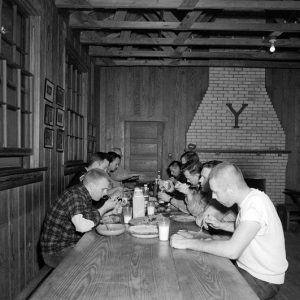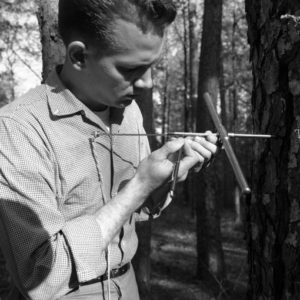calsfoundation@cals.org
Yale Camp
Approximately one mile east of Crossett (Ashley County), just off U.S. Highway 82, is the site of what was once an important adjunct to the Yale University School of Forestry. Built in 1946, the spring camp for Yale students of forest management provided a hands-on educational experience until its closure in 1966.
In the early 1900s, Yale University in New Haven, Connecticut, was perhaps an unlikely location of the nation’s premier school of forest management. To supplement work in the classroom, the school provided a spring field trip to southern forests, visiting as the guest of a different lumber company each year, since northern forests might still be under snow at the time of the field trip. The first trip to the forests of the Crossett Lumber Company occurred in 1912. Charles Harlan Watzek, an Iowan who graduated from the Yale School of Forestry in 1911, was instrumental in bringing the 1912 class to Crossett for its three months’ spring field study. His father, Dr. John W. Watzek, was an investor in and cofounder of the Crossett Lumber Company, which began operation in 1899. The spring field trip gave the students an opportunity to study forest management and wood utilization in the vast “laboratory” provided by the Crossett forests and the company’s manufacturing plants.
Exploitation of the southern forest in the early years came to be known as the “cut out and get out” method of wood production. Since the supply of wood fiber seemed to be virtually unlimited, sawmills were set up for the clear-cutting of the surrounding forest—usually over a period of twenty to thirty years. The manufacturing operation at that location would then be “moved” to a new location in the vast forest, where a new clear-cutting cycle would begin. As the concept of “sustained yield” forestry emerged in the l920s, Southern lumber companies began to seek trained foresters to guide the new process of forest management. Yale University was among the first colleges to recognize the need for the graduate study of silviculture, or the development and care of forests.
The Crossett Lumber Company engaged Yale professor Ralph Bryant as its first forestry consultant and began to employ academically trained foresters in 1923. Following Bryant’s retirement in 1938, Professor Herman Haupt Chapman took his post, and served to 1943. Professor Walter H. Meyer, in turn, succeeded him and served until the camp closed. All along, the tie between the Crossett Lumber Company and Yale was strengthened, and Yale graduates were hired by Crossett and other southern lumber companies.
Following World War II, the Crossett Lumber Company in 1946 offered the university a permanent site for its camp; prior to this, the students lived in sawmill dormitories. Yale Camp consisted of living cabins, teachers’ quarters, a shower house, and a mess hall. For the next twenty years, students from all over the United States and many foreign countries came to study at Yale Camp. The spring field study had evolved into an eleven-week course, with the study of forest management being followed by work in wood utilization and manufacturing. Thus, future foresters could observe the production process from the standing tree to the final product. The company made its mills available to the students, and its employees frequently were used as instructors.
Over time, the study of wood utilization in a manufacturing setting was supplanted by interest in environmental issues such as the preservation of woodlands. It became increasingly difficult to attract students to eleven weeks in a remote location, and Yale Camp was closed in 1966. Yale Camp was important in the development and evolution of professional forest management in the South, as its sign serves to remind.
For additional information:
Buckner, John W. Wilderness Lady: A History of Crossett, Arkansas. Little Rock: Rose Publishing Company, 1979.
Clark, Janice. “Crossett-Yale Have Enjoyed Close Relationship since 1912.” Forest Echoes. April 1958. On file at the Crossett Public Library, Crossett, Arkansas.
———. “Graduate Students Attending Yale Forestry Camp.” Forest Echoes. March 1947. On file at the Crossett Public Library, Crossett, Arkansas.
O. H. Darling Jr. and Bill Norman
Crossett, Arkansas
 Agriculture
Agriculture Yale Camp Cook
Yale Camp Cook  Yale Camp Dining Room
Yale Camp Dining Room  Yale Camp Student
Yale Camp Student 




Comments
No comments on this entry yet.